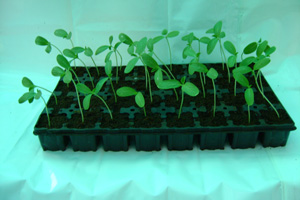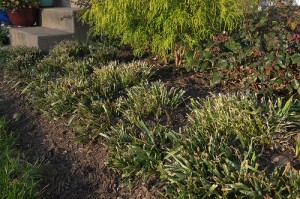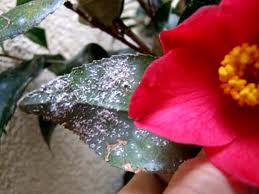Annuals
 To save money this spring, start your annuals indoors from seed. Flower seeds are very inexpensive and offer a great selection of choices. In Columbia, our last frost date is around March 21st. Seed packet instructions indicate how many weeks from time of sowing to outdoor planting are needed. Count backwards from March 21st to see when the seeds should be sown. The last frost date is a guideline, and actual weather conditions may not cooperate: Check the local forecast before actual planting outdoors!
To save money this spring, start your annuals indoors from seed. Flower seeds are very inexpensive and offer a great selection of choices. In Columbia, our last frost date is around March 21st. Seed packet instructions indicate how many weeks from time of sowing to outdoor planting are needed. Count backwards from March 21st to see when the seeds should be sown. The last frost date is a guideline, and actual weather conditions may not cooperate: Check the local forecast before actual planting outdoors!
Helpful tips:
- Use potting soil, not topsoil to grow your seeds.
- Moisten potting soil before planting seeds.
- Use clear plastic produce bags from grocery store purchases to enclose seed trays – this will create a mini-greenhouse effect for the seeds. Watch carefully, though! The bag should be removed at the first sign of emerging seedlings to prevent a fungal disease caused by too much moisture which could kill young seedlings.
To help the seedlings germinate, place the seed tray on top of the refrigerator, wasted space in many homes. The refrigerator will generate warm bottom heat which seedlings love. Be sure to use a cookie sheet or pie tin to catch any water runoff.
Turf
Enjoy the break from the heat and mowing, and plan for any spring soil improvement. Have you had a soil sample taken in the last three years? It takes about three months for the pH level of the soil to change, so a soil test now will allow for adjustments to be made to the soil prior to spring growth. Clemson Extension has a wonderful website at www.clemson.edu with instructions for taking soil samples. Take separate samples for a flower bed versus the turf grass. Soil tests should be taken to the extension office located near Clemson Road at Two Notch Road. The cost is just $6 per sample.
Perennials
- January is the perfect time to cut back liriope, also known as monkey grass. It can become filled with leaf debris or just look unkempt, so an annual cut back
 is beneficial. Use a weed eater to cut back to two inches above the soil. Rake away debris and remove.
is beneficial. Use a weed eater to cut back to two inches above the soil. Rake away debris and remove. - Monitor daylilies for aphids. Because Columbia typically has mild winters, aphids can overwinter in daylilies that have not gone completely dormant. Treat for aphids with insecticidal soap.
- January is a perfect month the enjoy early-blooming daffodils. No daffodils in the yard? Start planning where to plant them in the fall. The best places are where they can be viewed from inside the house through a window.
- Another January/February blooming perennial are Lenten roses. This plant is not a rose, as the name implies, but a terrific evergreen plant for shade.
Roses
Do not fertilize roses this month.
 Shrubs
Shrubs
It is still a good time to plant shrubs. Check hollies and camellias for evidence of scale infestation, appearing as non-moving white or light gray specs on the underside of leaves or stems. Treat with dormant oil which works to smother this insect.
Trees
It is prime time to plant a tree.




